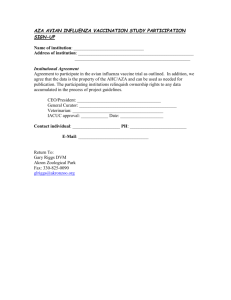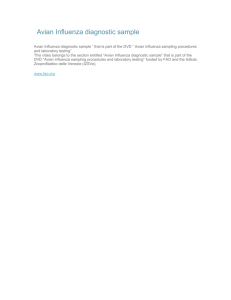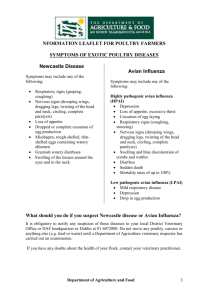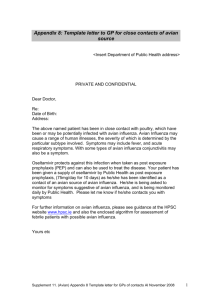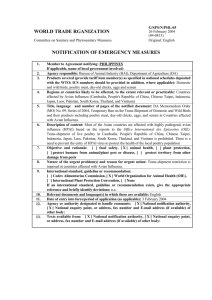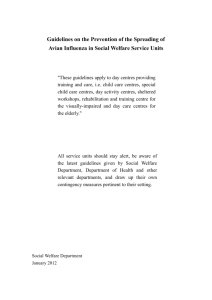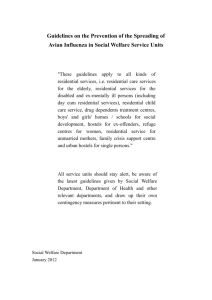Word Document (text
advertisement
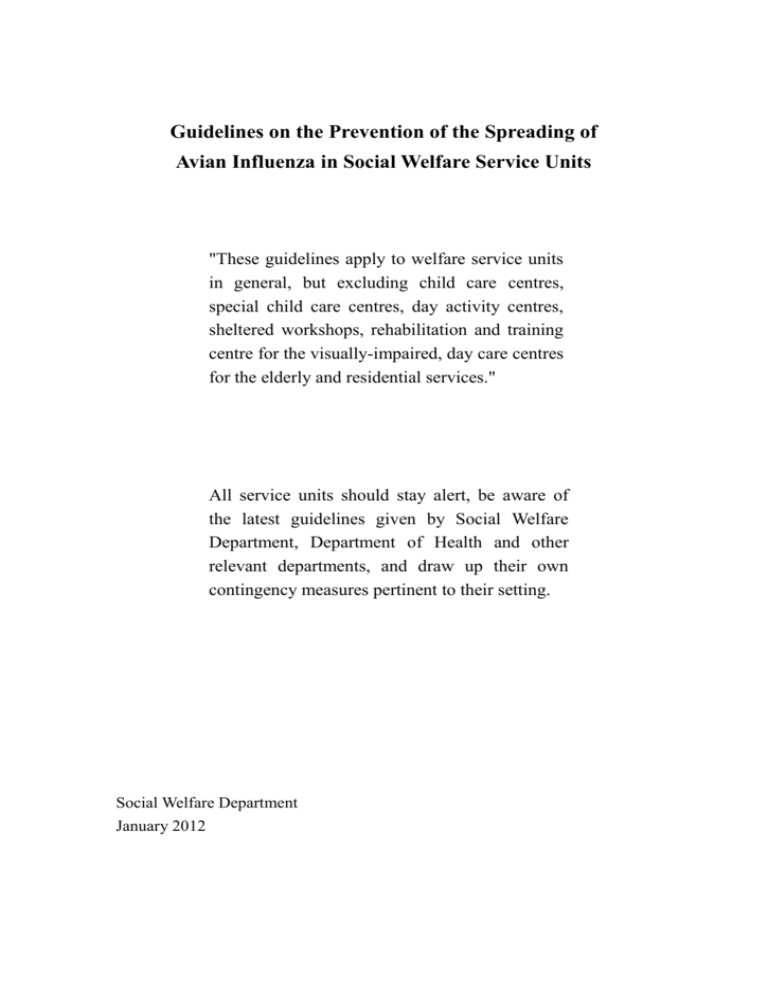
Guidelines on the Prevention of the Spreading of Avian Influenza in Social Welfare Service Units "These guidelines apply to welfare service units in general, but excluding child care centres, special child care centres, day activity centres, sheltered workshops, rehabilitation and training centre for the visually-impaired, day care centres for the elderly and residential services." All service units should stay alert, be aware of the latest guidelines given by Social Welfare Department, Department of Health and other relevant departments, and draw up their own contingency measures pertinent to their setting. Social Welfare Department January 2012 1. Civic Education – Prevention of the Spreading of Avian Influenza Starts with the Service Units 1.1 Service units should explain to staff and service users the importance of personal and environmental hygiene in preventing infectious diseases, in particular the infection of avian influenza. State the serious consequences of the spreading of avian influenza in Hong Kong. Emphasize the fact that preventing its spread is the social responsibility of everyone in the community, and encourage the staff and service users to consult their doctors promptly and notify the service units concerned and Department of Health (DH) in case of any suspected case of avian influenza. 1.2 Include relevant topics on the prevention of infectious disease / avian influenza in activities. Adopt diverse learning modes to enhance awareness and concern among staff and service users. They should be reminded to put their knowledge into practice and to heed personal and environmental hygiene in order to avoid infection, and furthermore, convey the message to relatives and friends. 1.3 Disseminate the message to staff, service users and family members through seminars or newsletters, and distribute to them leaflets or relevant materials published by the Social Welfare Department (SWD) or other organisations concerned. Service users and their family members should be provided with such information as the hotline numbers and websites of DH and SWD, etc. 2. Precautionary Measures 2.1 Service units should draw up precautionary and contingency measures on the basis of the latest guideline issued by SWD on the prevention of the spreading of avian influenza as well as the health advices issued by DH (such information can be downloaded from the homepage of SWD and DH: www.swd.gov.hk and www.chp.gov.hk). All staff and service users should be informed of these measures and in particular be advised of the symptoms of avian influenza. It should be highlighted that if they feel unwell, especially when they develop fever and / or respiratory symptoms such as coughing, sneezing, they should wear a mask, avoid participating in indoor / outdoor group activities, be sent to an isolated or quiet place for rest; and carers for these service users should also wear a mask. These service users should then be sent home preferably accompanied by a family member or to the Accident and Emergency Department of a nearby hospital (if seriously ill) and consult a doctor. For staff, they should be sent home and consult their doctor. 2.2 Service units should always remind their staff and service users to be aware of their own physical condition as well as other users’. If they are unwell, they should inform the supervisors of the service units immediately. Staff and service users should also be reminded not to share tableware, food and drinks with others to avoid infection. 2.3 Maintain good cleanliness and ventilation in the service units. Windows should be kept open. Air filters should be cleaned frequently for air-conditioned environment. Objects and equipment frequently touched by staff and service users should be wiped with 1 part of household bleach solution diluted in 99 part water regularly. Metal objects should be disinfected with 70% alcohol. If a vehicle is used to carry service users, good cleanliness and sanitation of the vehicle compartment should be ensured as well. 2.4 Liquid soap should be provided in the toilets. Public towels should not be used. Notices should be posted inside the toilets requiring staff and service users to use liquid soap for hand washing. 2.5 In organising group activities, good ventilation of the venue should be taken into account. Crowdedness should be avoided. Staff and service users who are unwell should be advised to avoid participating in the activities. Clean all equipments and game sets thoroughly before putting away or used by other groups. 2.6 Keep an up-to-date sick leave record of staff and obtain their prior consent for the release of personal data, such as names and telephone numbers to DH for investigation and follow-up action as and when necessary. 2.7 In case of an unusual increase in the number of staff / service users having respiratory tract infection symptoms, the Centre for Health Protection (CHP) of DH and the relevant Service Branches / Child Care Centres Advisory Inspectorate of SWD should be notified immediately (see Paragraph 5.2). 3. Alert Measures – Staff / Service Users Display No Symptom But Identified to be Collaterals / Close Contacts* (as defined by CHP / DH) of Avian Influenza Patients Outside the Service Units 3.1 All Collaterals / Close Contacts of avian influenza patients will be put under confinementδ for up to 7 days since last exposure to the same source of infection as the case / last contact with the avian influenza patient respectively. 3.2 Service units should post a notice at prominent locations to remind their staff and service users to inform the units immediately if they, even when they display no symptom, have been identified to be Collaterals / Close Contacts. Service units should facilitate the Collateral / Close Contact in staying away from work / activities of the service units during the confinement period. Such absence can be recorded as sick leave by the service unit and, if necessary, sick leave certificate can be obtained from DH through the staff / service user concerned. The service unit should inform the concerned Service Branch / Child Care Centres Advisory Inspectorate of SWD. 3.3 If a service unit has learned from other channels that its staff / service user had been identified to be Collaterals / Close Contacts, the unit should confirm the information with the staff / service user concerned. The unit may also approach DH for confirmation with written consent from the staff for DH to release the relevant information to the unit. The unit should then take action in accordance with Paragraph 3.2 above. * Collaterals are people who are at risk of exposing to the same source as the probable / confirmed human case. They may include travel collaterals or co-workers in poultry farm / market / retail outlet. The period of at risk of exposing to the source will be decided on a case-by-case basis. A Contact is defined as a person who had been in contact with the probable / confirmed human case during the infectious period i.e. from 1 day before onset of symptoms to 7 days after onset of symptoms if the case is an adult or to 21 days if the case is child 12 years of age. Close Contacts of the probable / confirmed human case are defined as a Contact who had risky exposures including having cared for, lived with or had direct contact with the respiratory secretions, body fluids and / or excretions of the case, or had face-to-face (within 1 metre) contact of the case. Close Contacts include care workers who had taken care of the case without appropriate personal protective equipment ( PPE ). δ Confinement applies to people who have been exposed to an illness. For avian influenza control, Collaterals / Close Contacts are put under confinement during the surveillance period. 3.4 Inform all staff, service users, their family members / carers of the situation. By doing so, their anxieties may be relieved. 3.5 As a precautionary measures, while the Collaterals / Close Contacts are being under confinement, the service unit should cleanse the unit premises and commonly used equipment using 1 part of household bleach solution diluted in 49 part water for the first time (Metal objects should be cleansed with 70% alcohol) and thereafter 1 part of household bleach solution diluted in 99 part water daily. All staff and service users should also be reminded to follow the precautionary measures under paragraph 2. 3.6 The service unit should keep a close watch on the health condition of other staff / service users. If any staff or service users develop symptoms of avian influenza, such as fever or respiratory symptoms, they should wear a mask, stop attending the unit and seek medical help promptly. 3.7 The service unit should provide counselling to staff and service users who bear mental and psychological stress. 4. Contingency Measures – Staff / Service Users Become Probable or Confirmed Avian Influenza Cases 4.1 If the last day of stay of the avian influenza patient at the service unit is less than 7 days, depending on the type of service and nature of activities, DH may advise the service unit to suspend services for thorough cleansing and / or until 7 days since the avian influenza patient last stayed at the service unit. 4.1.1 The service unit should facilitate DH in contact tracing by providing a list of staff and service users. DH will conduct an assessment to define if they are Collaterals / Close / Social Contacts#. 4.1.1.1 If some staff members are identified to be Collaterals Close Contacts, and have to be put under confinement, the service unit should facilitate them in staying away from work during # Social Contacts are Contacts but do not fit the definition of Close Contacts. the confinement period. 4.1.2 Notices should be displayed at prominent locations / newsletters should be issued to inform staff and service users and their family members / carers of the situation. By doing so, their anxieties may be relieved. They should also be reminded to be alert of the physical condition of every family member. 4.1.3 The service unit should cleanse the unit premises, according to paragraph 3.5. 4.1.4 Remind all staff and service users to inform the service unit and DH without delay, put on a mask, and seek medical treatment accordingly if there are any symptoms of the illness. Staff or service users who are sick, especially those with symptoms such as fever and cough, etc., should be discouraged from returning to the service unit. 4.2 4.1.5 The service unit should provide counselling to staff and service users who bear mental and psychological stress. 4.1.6 If the service has been suspended and DH considers it necessary to extend the period of suspension, the service unit should inform the concerned Service Branch / Child Care Centres Advisory Inspectorate of SWD, as well as services users and their family members / carers as appropriate. If the infected staff member or service user last stayed at the service unit more than 7 days ago, and no other person in the service unit displays symptoms of the disease, the service unit may stay open as usual. 4.2.1 The service unit may stay open as usual but the health condition of all staff and service users should be closely monitored. If the situation changes, DH and the relevant Service Branches / Child Care Centres Advisory Inspectorate of SWD should be notified immediately. 4.2.2 The service unit should cleanse and disinfect the unit premises and commonly used equipment as instructed by CHP. All staff and service users should be reminded to take precautionary measures. 4.2.3 Inform all service users and their family members / carers of the situation so that their anxieties may be relieved. Family members / carers should also be reminded to be alert of the physical condition of the service users. 4.2.4 In the event of special circumstances where service unit intends to suspend its operation completely or partially, it should discuss with DH and the relevant Service Branches / Child Care Centres Advisory Inspectorate of SWD. 5. Support / Enquiries 5.1 Department of Health 5.2 The Centre for Health Protection (CHP) : 2477 2772 Website of CHP : www.chp.gov.hk Central Health Education Unit (24-hour pre-recorded health education hotline of DH) : 2833 0111 Website of DH : www.dh.gov.hk Social Welfare Department SWD 24-hour hotline : 2343 2255 Enquiry telephone number of Child Care : 2835 2016 Centres Advisory Inspectorate Enquiry telephone number of the Family and : 2892 5177 Child Welfare Branch Enquiry telephone number of the Youth and : 2892 5130 Corrections Branch Enquiry telephone number of the : 2891 6379 Rehabilitation and Medical Social Services Branch Enquiry telephone number of the Elderly : 2892 5400 Branch (Service hours of enquiry telephone services of the Service Branches / Child Care Centres Advisory Inspectorate: Monday to Friday: 8:45 am - 1:00 pm 2:00 pm - 6:00 pm) Website of SWD : www.swd.gov.hk
